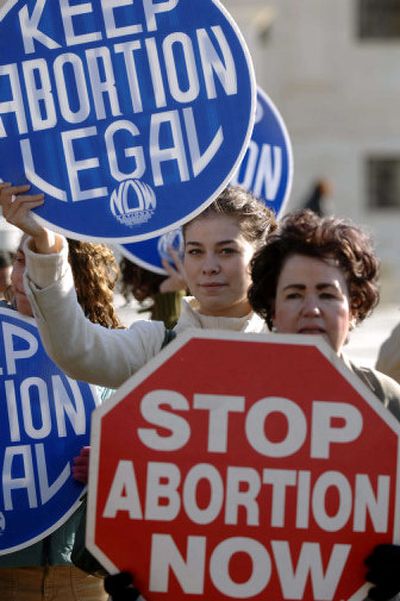Abortion back in Supreme Court

WASHINGTON – As demonstrators chanted and prayed outside, the Supreme Court heard its first abortion case in five years Wednesday, tackling a New Hampshire law that requires a minor to notify a parent before ending her pregnancy.
Lower courts struck down the 2003 law, saying it was unconstitutional because there was no exception for medical emergencies. A majority of the justices agreed Wednesday that there was a problem with the law, but seemed to split on whether lower courts were correct to toss out the statute.
“It’s a problem that arises only in the emergency situations… . Why does that even implicate the vast majority of the cases that don’t create emergency situations?” Chief Justice John Roberts asked the attorney for the American Civil Liberties Union, which challenged the law along with Planned Parenthood.
Justices David Souter and Ruth Bader Ginsburg said the New Hampshire legislature didn’t want to pass the law with a health exception. “We would be injecting an exception that they rejected,” Souter said during a lively, hour-long oral argument.
Participating in his first abortion case since joining the court in September, Roberts gave no indication of his views on the procedure’s constitutionality. The New Hampshire case doesn’t directly address the court’s landmark 1973 decision in Roe v. Wade, which guarantees a woman’s right to an abortion, and the justices are unlikely to depart from prior rulings allowing parental consent laws.
But the case still could have significant implications. The high court’s ruling could affect parental consent laws in three states that also don’t have medical emergency exceptions, as well as potentially affect the 2003 federal ban on so-called partial birth abortion. The federal law has never taken effect because it doesn’t have a health exception, causing lower courts to knock it down.
The Bush administration wants the Supreme Court to allow abortion laws to be challenged only after they take effect and actual harm can be shown. Roberts appeared to agree with that approach Wednesday.
Parental consent laws are common: 35 states have them. New Hampshire’s law requires a girl under 18 years old to get the consent of at least one parent and wait 48 hours before undergoing an abortion. The law has two exceptions: Girls who don’t want to tell a parent can get a judge to allow the abortion, and a doctor can end a pregnancy without any consent only to save a girl’s life.
But abortion-rights supporters said some pregnancies need to be ended immediately to prevent serious medical problems, such as stroke or organ damage. The law promised to make judges available around-the-clock, but opponents said no such system exists.